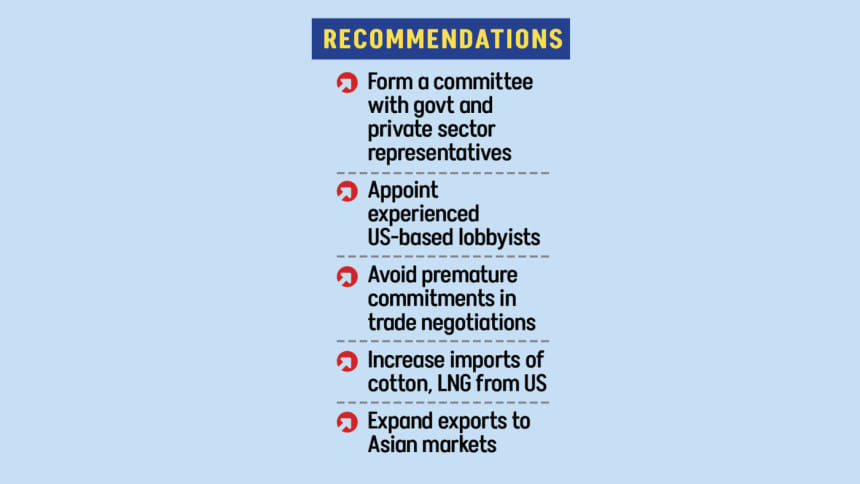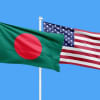Step up diplomacy as US tariff clock ticks away

Bangladesh must intensify trade diplomacy to protect garment exports from steep US tariffs as the clock runs down on a three-month reprieve, business leaders warned yesterday.
The call came at a roundtable discussion titled "Impact of US Tariffs on Bangladesh's Garment Industry: Challenges and Opportunities", organised by The Daily Star in Dhaka.
Currently, Bangladesh is the third-largest garment exporter to the US after China and Vietnam, commanding 9.3 percent of the $90 billion American apparel market annually. In 2024, Bangladesh shipped $7.34 billion worth of garment products to the US, marking a 35.95 percent year-on-year growth.

However, the country's foothold in its largest export market is now under severe threat, as President Donald Trump's administration imposes a 37 percent reciprocal tariff on top of the existing 16 percent duties. The broader implication is starker still: Bangladesh's global standing as the second-largest garment exporter after China is at risk.
"From the Korean side, there is growing concern regarding the future stability of Bangladesh's garment exports to the US," said Kihak Sung, chairman of Youngone Corporation. Sung warned that Vietnam was "very close" to overtaking Bangladesh and stressed the need for immediate, proactive measures.
Around 15 percent of Bangladesh's total exports, roughly $8 billion, go to the US. Reducing overreliance on a single market through diversification must be part of the strategy, he said.
Sung further pointed out that labour rights had become a prime agenda item under the Trump administration, calling for Bangladesh to define and address US demands methodically. He urged the mobilisation of organisations such as the International Labour Organization (ILO) and the World Bank to advocate on Bangladesh's behalf.
Speed to market should be another priority. "Timely deliveries and high-end, high-quality production are crucial," Sung said. He also called for a permanent trade negotiation team based in the US. "On-and-off discussions will not yield lasting results," he said.
Bangladesh must position itself diligently, Sung added, as the US administration actively pursues trade agreements with Korea, Australia, Japan, India and the UK.
To address US trade imbalance concerns, Sung proposed increasing imports from the US by at least $1 billion annually over the next three years. He stressed the need for a detailed and quantifiable plan rather than empty promises.
Sung also emphasised the importance of working closely with the US Embassy in Dhaka. "The embassy can play a pivotal role in advocating for Bangladesh," he said.
AK Azad, chairman and managing director of Ha-Meem Group, described the situation as "very critical."
"After the imposition of tariffs, customers are asking us to share the burden. Some customers are being illogical, asking us to absorb a portion of the tariffs, which is unethical," said Azad, whose company exports $800 million worth of goods annually, 90 percent of it to the US.
While the US government has suspended the new tariffs for three months, Azad said buyers are demanding discounts for at least one season. He called for the immediate appointment of lobbyists and the formation of a high-level committee, headed by a government adviser, with private sector representatives.
Reflecting on past cooperation during the export quota phase-out, Azad criticised the current government for failing to consult exporters properly. Citing talks with US officials, he said Bangladesh must propose specific measures to reduce the trade gap.
Anwar-Ul-Alam Chowdhury (Parvez), chairman of Evince Group, said the government's approach remained half-hearted. "Some officials still doubt the need for lobbyists," he said.
He said Bangladesh was trying to import more US goods such as raw cotton, LNG, soybeans, and medical instruments, but warned that "this will take time".
NEGOTIATION MUST BE STRATEGIC
Mohammad Abdur Razzaque, chairman of Research and Policy Integration for Development (RAPID), warned that "doing nothing is not an option."
Engagement with the US administration is important, but Bangladesh must be cautious, he said, because many experts believe the tariffs are unsustainable and might eventually be reversed.
Bangladesh must find its bargaining chips, Razzaque said, as larger economies like India have stronger leverage.
Although Bangladesh exports about $8 billion worth of goods to the US, only 40-50 percent of that value is actually created domestically, after accounting for imported inputs like fabrics and accessories.
This means, Razzaque said, the net value-added exports are closer to $3.6 billion. At the same time, Bangladesh imports around $2.6 billion worth of goods from the US, such as cotton, LNG and agricultural products.
As a result, Bangladesh's true trade surplus with the US is only about $1 billion — much smaller than the headline figures suggest, he said.
Negotiations must begin without making premature commitments, he advised. Otherwise, Bangladesh could be disadvantaged if the US policy shifts later.
Razzaque also pointed to opportunities if US imports shrink. "Chinese container traffic to the US is down 45 percent, and ship arrivals at US ports are down 33 percent," he said. "Shelves will soon start emptying."
He recommended maintaining export incentives even beyond LDC graduation under WTO flexibilities and suggested reviewing some supplementary duties to signal openness.
Md Fazlul Hoque, managing director of Plummy Fashions Ltd, said that with just two months remaining before a final US announcement on tariffs, large structural adjustments such as a full FTA negotiation were unrealistic.
"Even starting discussions might take more than two months," he said. Realistic goals should include full engagement with the US administration and signalling willingness, without making definitive commitments.
Hoque believes the tariffs are unsustainable and that Bangladesh is not the main target of the US measures. After Trump temporarily reduced tariffs, he became more confident that a reversal is possible, Hoque said.
NEED FOR NATIONAL DIALOGUE
Syed Sultan Uddin Ahmed, chairman of the Labour Reform Commission, argued that organisations like the ILO or the World Bank cannot speak on Bangladesh's behalf.
He proposed the creation of a National Social Dialogue Forum, bringing together the government, private sector, labour groups, international organisations, embassies, and trade partners for regular discussions.
Currently, he said, Bangladesh's approach is fragmented, with different groups working separately.
Faruque Hassan, managing director of Giant Group and former BGMEA president, said the Trump tariffs were not about reciprocity but about the US trade deficit.
He argued that Bangladesh could frame its response by highlighting imports of American goods such as cotton, soybean oil, LNG, fire safety equipment, and hardware -- the products already being purchased, often through regional hubs.
"We have to explain to the US that we are importing more agricultural products -- all at zero tariff," Hassan said.
Humayun Rashid, chairman of Energypac Fashions Ltd, dubbed the crisis the "3T issue" -- the Terrible Tariff of Trump.
He advocated a "watch and see" approach, noting that shortages on US shelves could shift the political scenario within months. Bangladesh, meanwhile, should focus on expanding into Asian and South American markets.
Drawing lessons from China's earlier experience with high US duties, Rashid urged the BGMEA to set up dedicated desks monitoring market trends across different regions.
Bangladeshi ambassadors, he added, must be judged by economic results, not just political reporting.
Mahfuz Anam, editor and publisher of The Daily Star, delivered the opening remarks, while Arun Devnath, deputy editor, moderated the discussion.

 For all latest news, follow The Daily Star's Google News channel.
For all latest news, follow The Daily Star's Google News channel. 





Comments